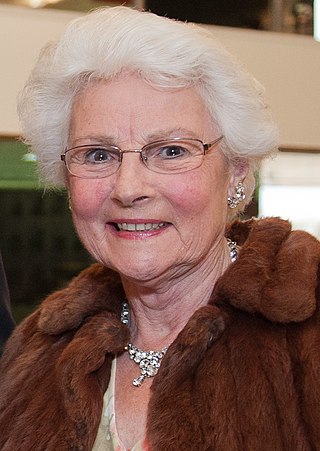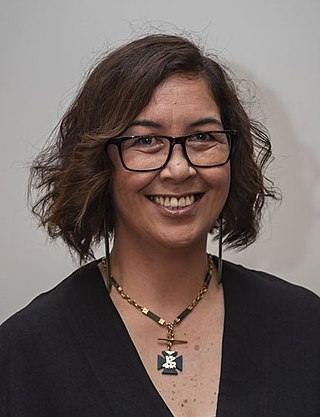
The University of Otago is a public research collegiate university based in Dunedin, Otago, New Zealand. Founded in 1869, Otago is New Zealand's oldest University and one of the oldest universities in Oceania.

Margaret Elizabeth Austin is a former New Zealand politician. She was an MP from 1984 to 1996, representing first the Labour Party and then briefly United New Zealand.

The Rutherford Medal is the most prestigious award offered by the Royal Society of New Zealand, consisting of a medal and prize of $100,000. It is awarded at the request of the New Zealand Government to recognize exceptional contributions to the advancement and promotion of public awareness, knowledge and understanding in addition to eminent research or technological practice by a person or group in any field of science, mathematics, social science, or technology. It is funded by the New Zealand government and awarded annually.

Christchurch Girls' High School in Christchurch, New Zealand, was established in 1877 and is the second oldest girls-only secondary school in the country, after Otago Girls' High School.

The Royal Society Te Apārangi is an independent, statutory not-for-profit body in New Zealand providing funding and policy advice in the fields of sciences and the humanities.

Christine Coe Winterbourn is a New Zealand biochemist. She is a professor of pathology at the University of Otago, Christchurch. Her research in the biological chemistry of free radicals earned her the 2011 Rutherford Medal and the Marsden Medal, the top awards from each of New Zealand's two top science bodies.

Rawinia Ruth Higgins is a New Zealand academic whose research focuses on Māori language and culture.
Elizabeth Maude Herriott was a New Zealand scientist and academic. She was the first woman appointed to the permanent teaching staff at Canterbury College, now the University of Canterbury.

Margaret Ann Bradshaw is a New Zealand geologist and a retired staff member at the University of Canterbury. She is considered a trailblazer and influential female role model in Antarctic research.

Wendy Alison Nelson is a New Zealand marine scientist and world expert in phycology. She is New Zealand's leading authority on seaweeds. Nelson is particularly interested in the biosystematics of seaweeds/macroalgae of New Zealand, with research on floristics, evolution and phylogeny, as well as ecology, and life history studies of marine algae. Recently she has worked on the systematics and biology of red algae including coralline algae, distribution and diversity of seaweeds in harbours and soft sediment habitats, and seaweeds of the Ross Sea and Balleny Islands.
The Prime Minister's Science Prizes are awarded yearly by the Prime Minister of New Zealand. They were first awarded in 2009 in order to raise the profile and prestige of science among New Zealanders. The 2019 awards were presented in early 2020.

Dame Carolyn Waugh Burns is a New Zealand ecologist specialising in lakes. She is an emeritus professor at the University of Otago.
Elisabeth Slooten is a New Zealand zoology academic. She is currently a full professor at the University of Otago.
Laurence Fearnley is a New Zealand short-story writer, novelist and non-fiction writer. Several of her books have been shortlisted for or have won awards, both in New Zealand and overseas, including The Hut Builder, which won the fiction category of the 2011 NZ Post Book Awards. She has also been the recipient of a number of writing awards and residencies including the Robert Burns Fellowship, the Janet Frame Memorial Award and the Artists to Antarctica Programme.

Bronwyn Mary Hayward is a New Zealand political scientist. Her areas of research are democracy, sustainability and young people. She was a lead author on a United Nations' Intergovernmental Panel on Climate Change Special Report.

Andrew Leachman was a master mariner with more than 55 years of seagoing experience. He captained New Zealand's research vessel Tangaroa for more than 20 years. He was posthumously awarded the New Zealand Antarctic Medal. A species of marine sea cucumber was named in his honour.
Suzanne Georgina Pitama is a New Zealand academic, is Māori, of Ngāti Kahungunu and Ngāti Whare descent and as of 2020 is a full professor at the University of Otago in Christchurch, New Zealand.

Atholl John Anderson is a New Zealand archaeologist who has worked extensively in New Zealand and the Pacific. His work is notable for its syntheses of history, biology, ethnography and archaeological evidence. He made a major contribution to the evidence given by the iwi (tribe) Ngāi Tahu to the Waitangi Tribunal.
Susan Elizabeth Gardiner is a New Zealand horticultural scientist, who works on using genetics and genomics for fruit breeding. Gardiner has received multiple awards. Gardiner has been a Fellow of the Royal Society Te Apārangi since 2020 and is a Fellow of the International Society for Horticultural Science. She is an Honorary Fellow of Plant & Food Research.
Tara G McAllister is a New Zealand freshwater ecology academic and is associated with Te Pūnaha Matatini at the University of Auckland. She is a Māori of Te Aitanga ā Māhaki, Ngāti Porou, and European descent.













